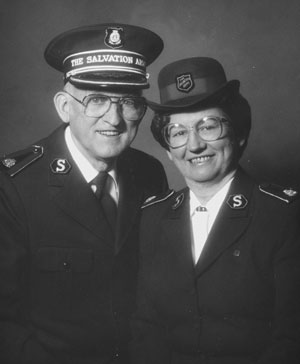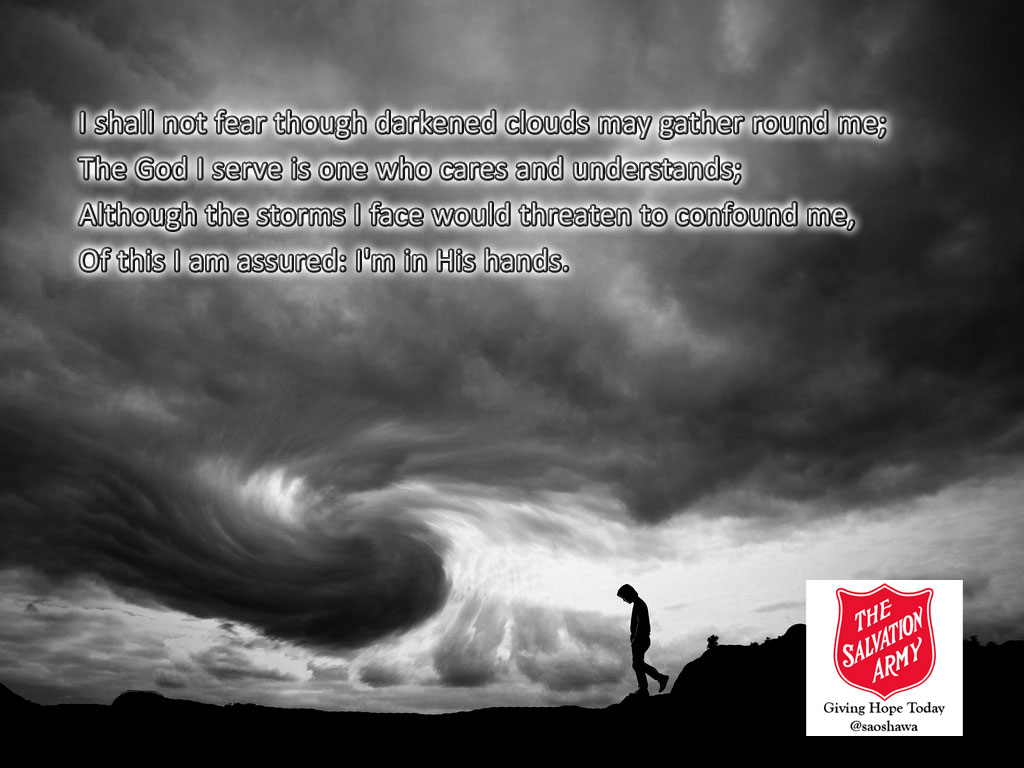I shall not fear though darkened clouds may gather round me;
The God I serve is one who cares and understands;
Although the storms I face would threaten to confound me,
Of this I am assured: I’m in His hands.
I’m in His hands, I’m in His hands;
Whate’er the future holds, I’m in His hands;
The days I cannot see have all been planned for me;
His way is best, you see; I’m in His hands.
What though I cannot know the way that lies before me,
I still can trust and freely follow His commands;
My faith is firm since He it is who watches o’er me;
Of this I’m confident: I’m in His hands.
In days gone by my Lord has always proved sufficient,
When I have yielded to the law of love’s demands;
Why should I doubt that He would evermore be present
To make His will my own? I’m in His hands!
A Scripture selection related to these reassuring words is Isaiah 41:10-13:
“So do not fear, for I am with you;
do not be dismayed, for I am your God.
I will strengthen you and help you;
I will uphold you with my righteous right hand.”
So do not fear, for I am with you Share on X
This song is the most well-known of Stanley Ditmer’s many compositions. It was written in 1956, and is based on his personal experience of God’s presence during times of trouble and concern. It has been translated into over 20 languages!
 Salvation Army Commissioner Stanley Ditmer was born in Youngstown, Ohio in 1924. His parents were Salvation Army officers. After high school, in 1943, Stanley joined the United States Navy, where he spent three years as a radio school instructor. Following this, he attended the Oberlin College Conservatory of Music. He then entered the Salvation Army Training College for Officers, in the “Peacemakers” session, being commissioned in 1949. Stanley also received a Bachelor of Science Degree from Skidmore College and did graduate work at New York University and the Psychological Corporation of New York.
Salvation Army Commissioner Stanley Ditmer was born in Youngstown, Ohio in 1924. His parents were Salvation Army officers. After high school, in 1943, Stanley joined the United States Navy, where he spent three years as a radio school instructor. Following this, he attended the Oberlin College Conservatory of Music. He then entered the Salvation Army Training College for Officers, in the “Peacemakers” session, being commissioned in 1949. Stanley also received a Bachelor of Science Degree from Skidmore College and did graduate work at New York University and the Psychological Corporation of New York.
Commissioner Ditmer served in varied appointments with his wife, including the final responsibility of being Territorial Commander, first in the USA Central Territory and then in the Eastern Territory, from which position he retired in 1990. He was Promoted to Glory in 2003.
The God I serve is one who cares and understands Share on XWORDS AND MUSIC: STANLEY DITMER
NEW MUSIC FOR CHORUS ONLY: PHIL LAEGER
S.A. SONG BOOK, 2015 EDITION, #848; 1987 EDITION, #732
REFERENCES: KLEPKE, STEEF, THE GOLDEN PEN; S.A. SONG BOOK WEBSITE
Have a listen to this timeless classic, a beautiful song in its original version and the recently updated version Share on XHave a listen to this timeless classic, a beautiful song in its original version and below, the recently updated version







